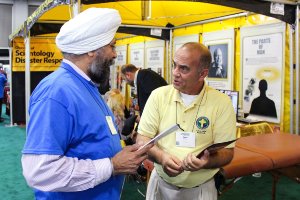An ice-breaking, shoulder-relaxing welcome to a place of worship is the brain-child of the Rev. Susan Sparks. A comedian-turned-minister, currently spiritual leader of NYC’s Madison Avenue Baptist Church, she uses both talents to help her flock focus less on what divides them and more on what brings them closer together and to God.

Sparks is a member, along with a rabbi and a Muslim comic of the Laugh in Peace comedy tour. She freely uses gags at the top of her sermons to lighten things up so that she then can move on to the touchier topics.
One sermon begins with a passionate battle over what topping is better to use on a sweet potato casserole. “There’s things that we all experience,” Sparks says, “and we can start there and find that place, enjoy a little moment where we can share something and take tiny baby steps off that to move into harder territory.”
Preaching used to be a pretty straightforward job. Its consistent message, with variations: Scripture says don’t sin, so knock it off. All that has changed, according to Andrew Hanauer, president and CEO of One America Movement, a Maryland-based organization founded in 2017 that supports leaders of congregations, from Southern Baptists to mainline Protestants to Muslims.
He now says that people “would listen to the news and say, well, that does or doesn’t fit in with my faith.” The job description has shifted. Now there are new questions. “How do you preach in a way that moves people out of complacency about the world in general but also lets them know this is not a Democratic church or a Republican church, it’s a church for all God’s people?”
In recent years church leaders can feel like they’re walking a fine line into the valley of the shadow of “toxic polarization,” as Hanauer calls it. Congregations can be divided and often downright hostile.
In a search for common ground, Rabbi Rachel Schmelkin found that members of her Washington, D.C. Reform synagogue were just plain angry, no matter their position on the current Israel-Hamas war. So she preached about that, counseling her flock to emulate God and be “slow to anger.” Draw “a deep, intentional breath before reacting,” she said, “as the first step we can take to better manage our anger.”
Last month, she led a “healthy conversations” workshop for young adults coping with disagreements they had with friends about the war and gave them a dialogue they could use that had been developed by the One America Movement and Over Zero, a group that uses communication to reduce division and violence. One participant told Schmelkin afterward that she used the script with a friend with whom she had major differences about the war, “and she felt like it saved her friendship.”
Pastor Joel Rainey, who leads a West Virginia evangelical church, takes a direct approach to divisiveness. He hosts the occasional “special edition” of his preaching podcast to answer questions he’s received from his congregation, representing a broad political spectrum, about controversial and contentious issues such as Christian nationalism and Israel.
On the subject of Israel, for example, he tells his listeners, “When Psalm 122 says ‘Pray for the peace of Jerusalem,’ it’s not just the Jews. It’s everybody living in that space.”
Rainey, who has been involved in interfaith activities, including a musical concert with Jews and Muslims at his church, encourages people to talk directly to one another, instead of about one another to others.
The Rev. Jess Shults of the Colossian Forum, an organization that trains faith leaders “not to resolve conflict, but to transform our desires in the midst of disagreement in order to cultivate virtue, leading to a more effective witness to our world,” says that just speaking from the pulpit is not sufficient in today’s polarized climate.
“In an ideal setup, one would be pairing a sermon with, then, some kind of post-sermon conversation during an adult-ed hour,” she says, “so that one is recognizing the place of power they have when delivering a sermon and the community could be brought in.”
Matthew D. Kim and Paul A. Hoffman make the point in their book “Preaching to a Divided Nation” that religious leaders must address polarization and seek unity, not just for the sake of the congregation but also to set a peaceful example for the world beyond it.
Different ministers, pastors, rabbis, imams and other shepherds of spiritual flocks have their own methods, their own styles. But all who succeed in bringing their congregations together, not just under one roof but under abundant love and faith, share the common denominator of doing it without rancor, blame or fault-finding.
Or as Reverend Sparks puts it, “I preach with a smile, a comedic edge and a deep sense of hope.”
Faced with that 1-2-3 punch, no congregant can stay irked for long.
From its beginnings, the Church of Scientology has recognized that freedom of religion is a fundamental human right. In a world where conflicts are often traceable to intolerance of others’ religious beliefs and practices, the Church has, for more than 50 years, made the preservation of religious liberty an overriding concern.
The Church publishes this blog to help create a better understanding of the freedom of religion and belief and provide news on religious freedom and issues affecting this freedom around the world.
The Founder of the Scientology religion is L. Ron Hubbard and Mr. David Miscavige is the religion’s ecclesiastical leader.
For more information, visit the Scientology website or Scientology Network.


